
Crafting a Continuous Youtube Video Stream From Separate Files for 2024

Crafting a Continuous Youtube Video Stream From Separate Files
How to Merge/Combine/Join YouTube (FLV) Videos

Richard Bennett
Mar 27, 2024• Proven solutions
YouTube is the most popular video sites in the world. You may have downloaded loads of videos from this website. But how to merge them together so that you can play all YouTube videos as one either on a PC, device, or TV? Here a professional YouTube merger is introduced in part 1 for you to easily complete the job. If you just want to merge the videos that have been already uploaded to YouTube, the YouTube Video Editor can help you with that.
Part 1: How to Merge Downloaded YouTube Videos
Part 2: How to Merge YouTube Videos Online
Part 1: How to Merge Downloaded YouTube Videos
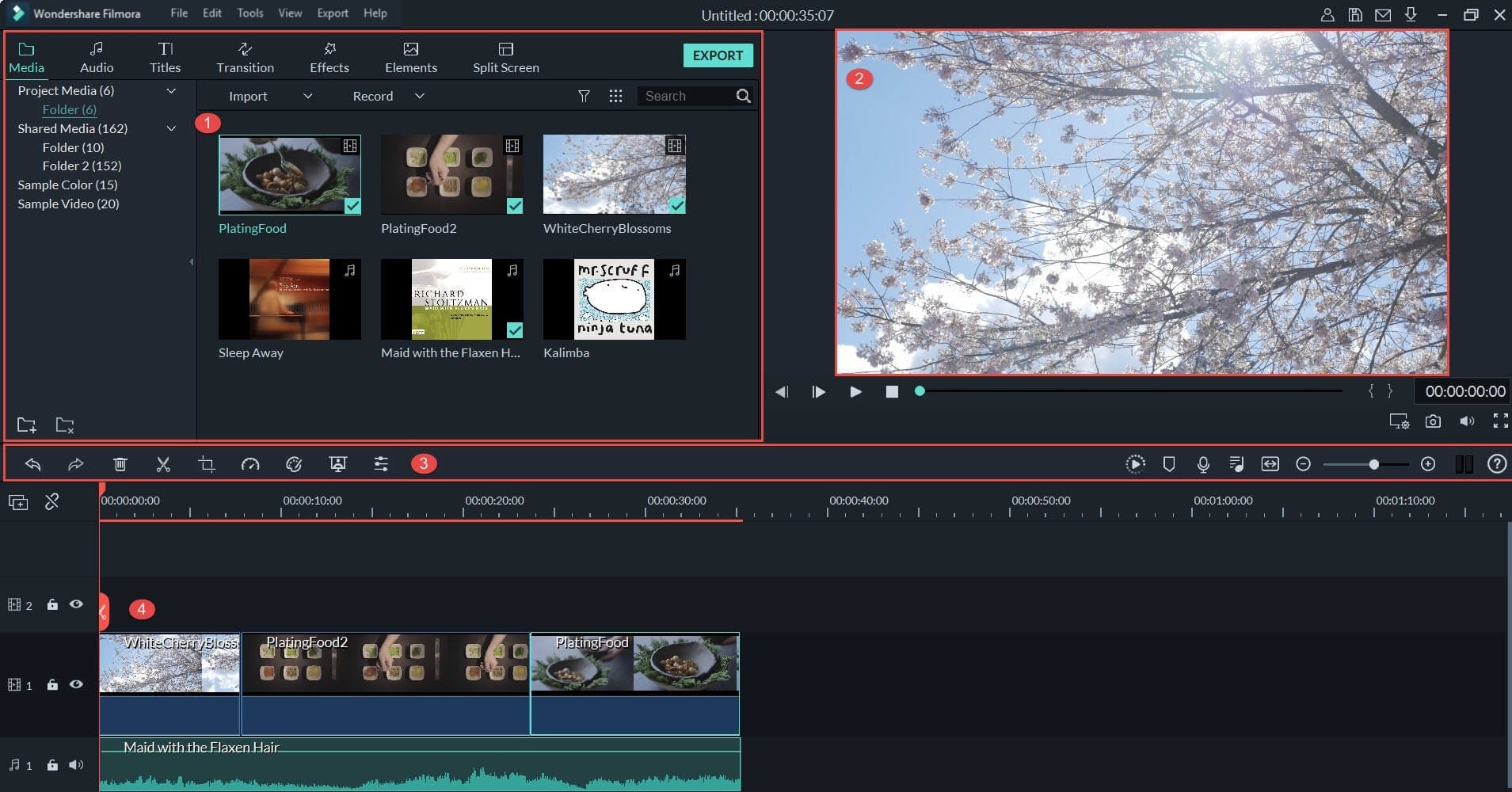
Tool you need: Wondershare Filmora video editor
Wondershare Filmora is an easy-to-use video editing tool. With it, YouTube videos will be automatically merged orderly without interrupts. On top of that, you can add transitions between two YouTube videos to make your videos more harmonious. It also enables you to easily make a picture-in-picture (PIP) video , which is definitely another creative way to merge YouTube videos.
Sounds good? Download it now and use this YouTube merger to merge all your YouTube videos.
Below is the details about how to merge YouTube video in Filmora
Step 1.Import YouTube files to the program
Download and install Wondershare Filmora. It gives good support to the downloaded YouTube videos (usually in FLV or MP4 format). You can either click “Import” on the primary windows and select YouTube video files from your computer, or simply drag and drop YouTube video files from File Explorer to the User’s Album.
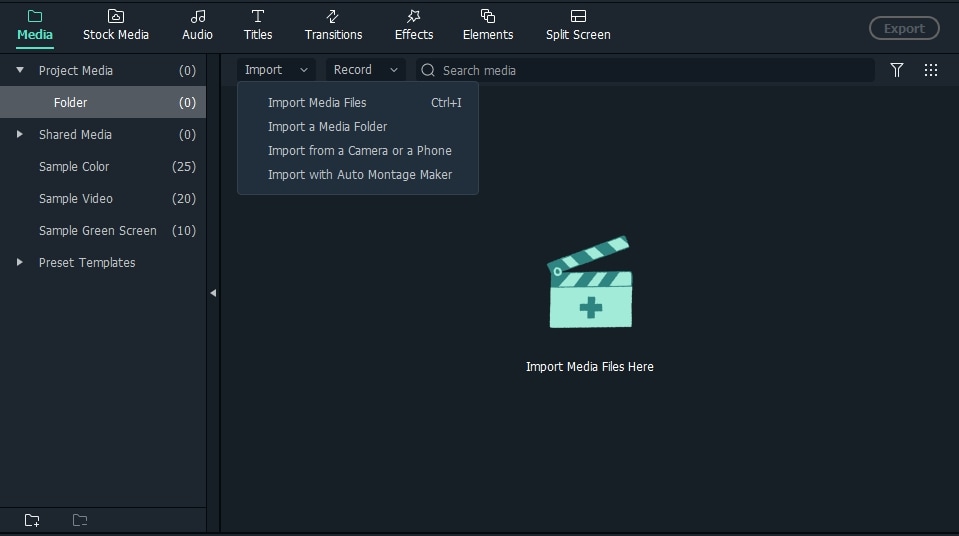
Step 2. Drag and drop YouTube videos to merge
To merge YouTube videos, select multiple YouTube videos in the User’s Album by holding down Ctrl or Shift key, and then drag and drop them to the video track on the Timeline. All YouTube files will join one after another without interrupts and there is none transition by default, but you can add transitions between video clips as you want. This will be introduced in Step 3.
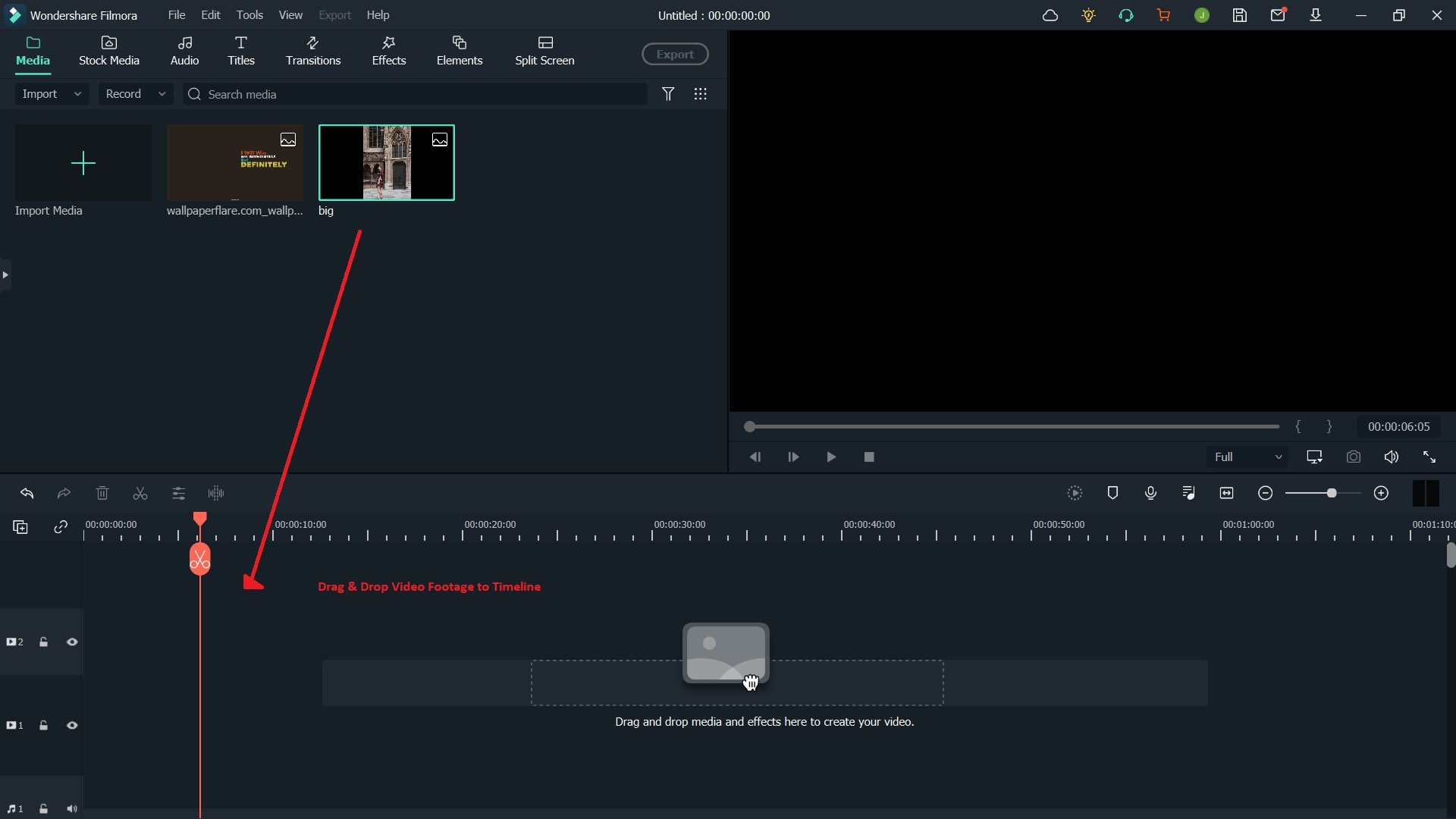
Step 3. Merge YouTube videos with transition
By adding transitions, YouTube videos will flow nicely from one to the next. To do so, switch to Transition tab, and drag the desired transition to the Timeline. Alternatively, right click any transition and choose “Apply to All” and “Random to All” from the popup menu to add transitions between YouTube videos in seconds.
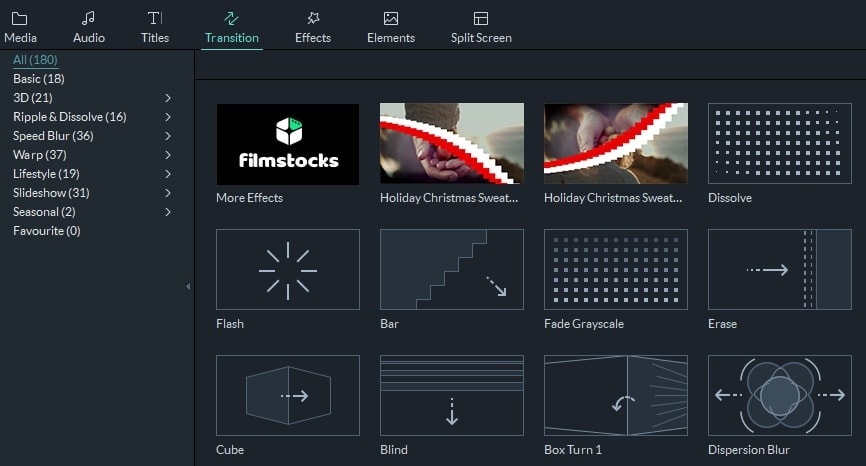
Step 4. Merge multiple YouTube files into one
Make sure you are satisfied with everything. You can click Play button to preview how YouTube videos will be merged. If the result is good, click “Export” button to save the YouTube video as one.
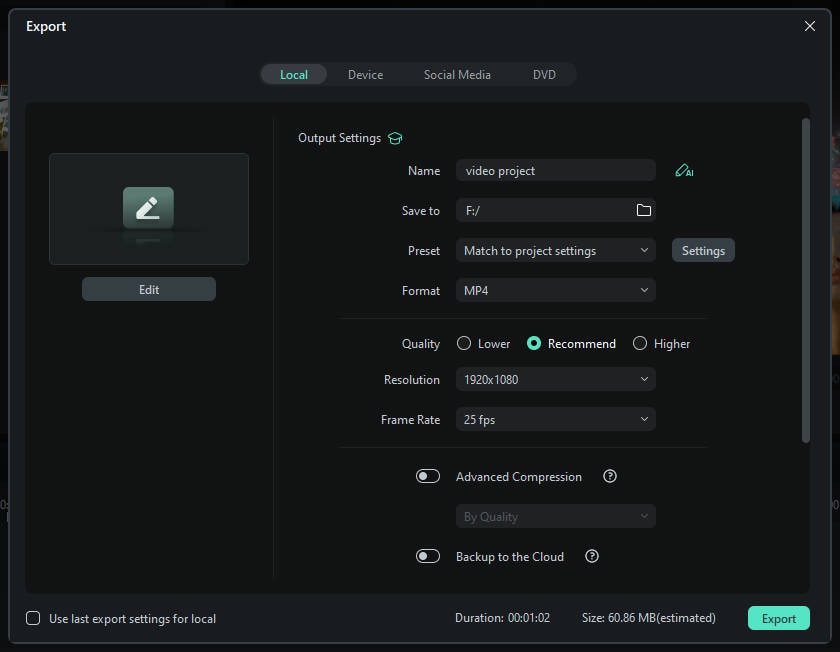
Therefore, go to the “Format” tab and select one desired format and click Create to start merging YouTube videos. By the way, if you want to play the merged YouTube files on iPod, iPhone, iPad, choose “Device” and select your device from the list. You can also directly upload back to YouTube for sharing or burn to DVD for playing on TV.
Part 2: How to Merge YouTube Videos Online
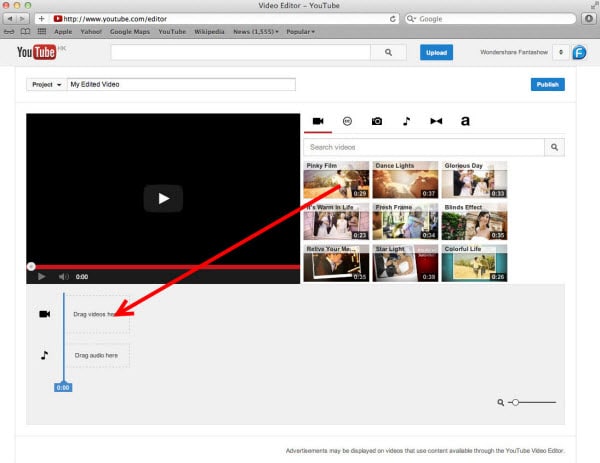
Tool you need: YouTube Video Editor
YouTube Video Editor is a browser-based video editor released by YouTube itself. It enables users to make minor edits to videos they’ve uploaded onto YouTube, as well as merge several clips together into one. It requires no additional software, or browser plug-ins (besides Adobe’s Flash), which makes it convenient to use. However, it lacks many basic features of modern day consumer video editing software and often crashes while dealing with large video files.

Get access to the editor
Sign in to your YouTube (or Google) account. Click “Upload”>> “Edit” to the Video Editor tab.

Place videos on the timeline
Simply drag the videos that need merge onto the timeline or hit the plus icon in the top right hand corner of each clip.

Save the settings
Review the result. If satisfied, hit the “Publish” button to save the settings.

Richard Bennett
Richard Bennett is a writer and a lover of all things video.
Follow @Richard Bennett
Richard Bennett
Mar 27, 2024• Proven solutions
YouTube is the most popular video sites in the world. You may have downloaded loads of videos from this website. But how to merge them together so that you can play all YouTube videos as one either on a PC, device, or TV? Here a professional YouTube merger is introduced in part 1 for you to easily complete the job. If you just want to merge the videos that have been already uploaded to YouTube, the YouTube Video Editor can help you with that.
Part 1: How to Merge Downloaded YouTube Videos
Part 2: How to Merge YouTube Videos Online
Part 1: How to Merge Downloaded YouTube Videos

Tool you need: Wondershare Filmora video editor
Wondershare Filmora is an easy-to-use video editing tool. With it, YouTube videos will be automatically merged orderly without interrupts. On top of that, you can add transitions between two YouTube videos to make your videos more harmonious. It also enables you to easily make a picture-in-picture (PIP) video , which is definitely another creative way to merge YouTube videos.
Sounds good? Download it now and use this YouTube merger to merge all your YouTube videos.
Below is the details about how to merge YouTube video in Filmora
Step 1.Import YouTube files to the program
Download and install Wondershare Filmora. It gives good support to the downloaded YouTube videos (usually in FLV or MP4 format). You can either click “Import” on the primary windows and select YouTube video files from your computer, or simply drag and drop YouTube video files from File Explorer to the User’s Album.

Step 2. Drag and drop YouTube videos to merge
To merge YouTube videos, select multiple YouTube videos in the User’s Album by holding down Ctrl or Shift key, and then drag and drop them to the video track on the Timeline. All YouTube files will join one after another without interrupts and there is none transition by default, but you can add transitions between video clips as you want. This will be introduced in Step 3.

Step 3. Merge YouTube videos with transition
By adding transitions, YouTube videos will flow nicely from one to the next. To do so, switch to Transition tab, and drag the desired transition to the Timeline. Alternatively, right click any transition and choose “Apply to All” and “Random to All” from the popup menu to add transitions between YouTube videos in seconds.

Step 4. Merge multiple YouTube files into one
Make sure you are satisfied with everything. You can click Play button to preview how YouTube videos will be merged. If the result is good, click “Export” button to save the YouTube video as one.

Therefore, go to the “Format” tab and select one desired format and click Create to start merging YouTube videos. By the way, if you want to play the merged YouTube files on iPod, iPhone, iPad, choose “Device” and select your device from the list. You can also directly upload back to YouTube for sharing or burn to DVD for playing on TV.
Part 2: How to Merge YouTube Videos Online

Tool you need: YouTube Video Editor
YouTube Video Editor is a browser-based video editor released by YouTube itself. It enables users to make minor edits to videos they’ve uploaded onto YouTube, as well as merge several clips together into one. It requires no additional software, or browser plug-ins (besides Adobe’s Flash), which makes it convenient to use. However, it lacks many basic features of modern day consumer video editing software and often crashes while dealing with large video files.

Get access to the editor
Sign in to your YouTube (or Google) account. Click “Upload”>> “Edit” to the Video Editor tab.

Place videos on the timeline
Simply drag the videos that need merge onto the timeline or hit the plus icon in the top right hand corner of each clip.

Save the settings
Review the result. If satisfied, hit the “Publish” button to save the settings.

Richard Bennett
Richard Bennett is a writer and a lover of all things video.
Follow @Richard Bennett
Richard Bennett
Mar 27, 2024• Proven solutions
YouTube is the most popular video sites in the world. You may have downloaded loads of videos from this website. But how to merge them together so that you can play all YouTube videos as one either on a PC, device, or TV? Here a professional YouTube merger is introduced in part 1 for you to easily complete the job. If you just want to merge the videos that have been already uploaded to YouTube, the YouTube Video Editor can help you with that.
Part 1: How to Merge Downloaded YouTube Videos
Part 2: How to Merge YouTube Videos Online
Part 1: How to Merge Downloaded YouTube Videos

Tool you need: Wondershare Filmora video editor
Wondershare Filmora is an easy-to-use video editing tool. With it, YouTube videos will be automatically merged orderly without interrupts. On top of that, you can add transitions between two YouTube videos to make your videos more harmonious. It also enables you to easily make a picture-in-picture (PIP) video , which is definitely another creative way to merge YouTube videos.
Sounds good? Download it now and use this YouTube merger to merge all your YouTube videos.
Below is the details about how to merge YouTube video in Filmora
Step 1.Import YouTube files to the program
Download and install Wondershare Filmora. It gives good support to the downloaded YouTube videos (usually in FLV or MP4 format). You can either click “Import” on the primary windows and select YouTube video files from your computer, or simply drag and drop YouTube video files from File Explorer to the User’s Album.

Step 2. Drag and drop YouTube videos to merge
To merge YouTube videos, select multiple YouTube videos in the User’s Album by holding down Ctrl or Shift key, and then drag and drop them to the video track on the Timeline. All YouTube files will join one after another without interrupts and there is none transition by default, but you can add transitions between video clips as you want. This will be introduced in Step 3.

Step 3. Merge YouTube videos with transition
By adding transitions, YouTube videos will flow nicely from one to the next. To do so, switch to Transition tab, and drag the desired transition to the Timeline. Alternatively, right click any transition and choose “Apply to All” and “Random to All” from the popup menu to add transitions between YouTube videos in seconds.

Step 4. Merge multiple YouTube files into one
Make sure you are satisfied with everything. You can click Play button to preview how YouTube videos will be merged. If the result is good, click “Export” button to save the YouTube video as one.

Therefore, go to the “Format” tab and select one desired format and click Create to start merging YouTube videos. By the way, if you want to play the merged YouTube files on iPod, iPhone, iPad, choose “Device” and select your device from the list. You can also directly upload back to YouTube for sharing or burn to DVD for playing on TV.
Part 2: How to Merge YouTube Videos Online

Tool you need: YouTube Video Editor
YouTube Video Editor is a browser-based video editor released by YouTube itself. It enables users to make minor edits to videos they’ve uploaded onto YouTube, as well as merge several clips together into one. It requires no additional software, or browser plug-ins (besides Adobe’s Flash), which makes it convenient to use. However, it lacks many basic features of modern day consumer video editing software and often crashes while dealing with large video files.

Get access to the editor
Sign in to your YouTube (or Google) account. Click “Upload”>> “Edit” to the Video Editor tab.

Place videos on the timeline
Simply drag the videos that need merge onto the timeline or hit the plus icon in the top right hand corner of each clip.

Save the settings
Review the result. If satisfied, hit the “Publish” button to save the settings.

Richard Bennett
Richard Bennett is a writer and a lover of all things video.
Follow @Richard Bennett
Richard Bennett
Mar 27, 2024• Proven solutions
YouTube is the most popular video sites in the world. You may have downloaded loads of videos from this website. But how to merge them together so that you can play all YouTube videos as one either on a PC, device, or TV? Here a professional YouTube merger is introduced in part 1 for you to easily complete the job. If you just want to merge the videos that have been already uploaded to YouTube, the YouTube Video Editor can help you with that.
Part 1: How to Merge Downloaded YouTube Videos
Part 2: How to Merge YouTube Videos Online
Part 1: How to Merge Downloaded YouTube Videos

Tool you need: Wondershare Filmora video editor
Wondershare Filmora is an easy-to-use video editing tool. With it, YouTube videos will be automatically merged orderly without interrupts. On top of that, you can add transitions between two YouTube videos to make your videos more harmonious. It also enables you to easily make a picture-in-picture (PIP) video , which is definitely another creative way to merge YouTube videos.
Sounds good? Download it now and use this YouTube merger to merge all your YouTube videos.
Below is the details about how to merge YouTube video in Filmora
Step 1.Import YouTube files to the program
Download and install Wondershare Filmora. It gives good support to the downloaded YouTube videos (usually in FLV or MP4 format). You can either click “Import” on the primary windows and select YouTube video files from your computer, or simply drag and drop YouTube video files from File Explorer to the User’s Album.

Step 2. Drag and drop YouTube videos to merge
To merge YouTube videos, select multiple YouTube videos in the User’s Album by holding down Ctrl or Shift key, and then drag and drop them to the video track on the Timeline. All YouTube files will join one after another without interrupts and there is none transition by default, but you can add transitions between video clips as you want. This will be introduced in Step 3.

Step 3. Merge YouTube videos with transition
By adding transitions, YouTube videos will flow nicely from one to the next. To do so, switch to Transition tab, and drag the desired transition to the Timeline. Alternatively, right click any transition and choose “Apply to All” and “Random to All” from the popup menu to add transitions between YouTube videos in seconds.

Step 4. Merge multiple YouTube files into one
Make sure you are satisfied with everything. You can click Play button to preview how YouTube videos will be merged. If the result is good, click “Export” button to save the YouTube video as one.

Therefore, go to the “Format” tab and select one desired format and click Create to start merging YouTube videos. By the way, if you want to play the merged YouTube files on iPod, iPhone, iPad, choose “Device” and select your device from the list. You can also directly upload back to YouTube for sharing or burn to DVD for playing on TV.
Part 2: How to Merge YouTube Videos Online

Tool you need: YouTube Video Editor
YouTube Video Editor is a browser-based video editor released by YouTube itself. It enables users to make minor edits to videos they’ve uploaded onto YouTube, as well as merge several clips together into one. It requires no additional software, or browser plug-ins (besides Adobe’s Flash), which makes it convenient to use. However, it lacks many basic features of modern day consumer video editing software and often crashes while dealing with large video files.

Get access to the editor
Sign in to your YouTube (or Google) account. Click “Upload”>> “Edit” to the Video Editor tab.

Place videos on the timeline
Simply drag the videos that need merge onto the timeline or hit the plus icon in the top right hand corner of each clip.

Save the settings
Review the result. If satisfied, hit the “Publish” button to save the settings.

Richard Bennett
Richard Bennett is a writer and a lover of all things video.
Follow @Richard Bennett
Maximizing Revenue: Average Income From YouTube’s AdSense Per Thousand Watchers
YouTubers are fantastic people who create content and make a living out of it. But have you ever thought about how much YouTube pays or what YouTube AdSense earnings are?
If you aren’t sure about the YouTube payment situation or how much AdSense pay for views, you will learn this below. Whether you’re planning to create a channel or already have one, learning how much you can expect YouTube to pay will help you in the longer run.
Be it AdSense pay on 1,000 views or AdSense pay per click; this blog features information you may appreciate.
- Type of Content
- Keywords
- User Location
- Time Requires to Get Views
- Video Duration
- Your Niche or Industry
Part 1: How Much Does AdSense Pay Per 1,000 Views

As a content creator, you might be tempted to know how much you can expect to earn through AdSense. Since it’s a free and simple way to make extra bucks, showing ads with the content you produce for online platforms, it’s essential to know how much it pays for views.
Pay Per 1,000 Views by AdSense
For 1,000 views, expect AdSense to pay around $8-$20. However, your total earnings will depend on factors such as your content type, users’ location, and setting of ads in Google AdSense, so it can pay on thousand views.
More so, AdSense opts for Revenue Per 1,000 impressions or (RPM) to showcase the amount you would get for 1,000 impressions. Remember, this RPM doesn’t include the actual amount you’ve earned. But it focuses on dividing your earnings by page views and impressions, then multiplying those by 1,000.
You can also refer to the formula for better understanding.
Formula:
RPM = (Estimated earnings / Number of page views) * 1000
From this formula provided by Google official, we can easily know that
Estimated earnings = (RPM * Number of page views) / 1000
To understand it further, see the example below.
Suppose you’ve earned around $0.10 from 20 page views; your page RPM would be $6.00 in simpler terms.
($0.10 / 25) * 1000 = $6.00
Also, if RPM is $4.00 from 45,000 ad impressions, your estimated earnings would be equal $180.00
($4.00 * 45,000) / 1000 = $180.00
AdSense Pay Per View
Lastly, if you’re looking for an exact answer regarding how much it pays per view, know that it varies and is based on different factors, such as niche or audience demographic.
But you can expect something between $8 to $12 on 1,000 views after monetizing your YouTube channel with your Google AdSense account.
Part 2: How Much Does AdSense Pay Per Click?

After understanding AdSense’s way to pay for 1,000 views, formula, or pay per view, here’s what you need to know about AdSense’s payment on per click policy.
On Average, you can expect AdSense to pay something around $0.20 to $15 on a click. Talking about estimated earnings or one click, it depends on the cost-per-click in the niche, including the publisher’s earnings and competition among rival advertisers.
And if you’re wondering, cost-per-click is when a user clicks on your ad, and you earn money for it. However, advertisers always decide the cost-per-click for ads. In this case, some advertisers don’t hesitate to pay extra, depending on what they intend to advertise.
Part 3: AdSense Earnings Per Thousand Pageviews Examples
From pay per 1,000 views to pay per click, understanding the AdSense payment policy is essential if you’re up to monetize your YouTube channel.
Since there’re YouTube AdSense requirements, such as audience demographic, niche, or content, learning about which niche is the lucrative one will also help you decide your next move.
Let’s take a look at the following examples for better understanding:
- For example, if arts and entertainment is your niche, you can expect to earn $5.62 after accumulating 1,000 pageviews.
- Creators who create content on vehicles can earn around $9.20 on every 1,000 pageviews.
- If you’re into beauty and fitness, expect to earn up to $13.01 on 1,000 pageviews.
- For real estate, health, home, and garden niches, you can earn $14.50, $17.40, and $23.35 on every 1,000 pageviews.
Remember, people from North America can make the most of these earnings. But worry not if you are based outside North America. Because Google AdSense revenue calculator can help you find the average pageviews on monthly basis.
Part 4: Earnings from AdSense: Factors to Consider
After learning how much you can earn in different niches, it’s equally important to focus on the following factors, so you can qualify and start earning from AdSense with ease.
1) Type of Content
To monetize your videos for AdSense, ensure that you own the rights to use visuals and audio elements of your video. And focus on creating all elements of your video yourself.
For YouTube, you can try creating tutorials, do-it-yourself videos, original short films, original music videos, home videos, travel vlogs, or even daily-life vlogs.
While creating content for YouTube, remember advertisers consider placing ads on more advertiser-friendly content.
As a blogger, you must provide unique but quality content to exceed AdSense’s eligibility criteria. Having unique content helps Google understand what your website is about. It’s even better if your website provides a one-of-its-kind experience and users visit it again.
Be it a vlog or blog, please ensure that it’s original and not a copy from other sources. This way, you can elevate your credibility on the respective platforms. For a great user experience, opt for intuitive navigation.

And to up your content game, you can even use the calculator to determine the value of your content and estimated revenue from AdSense.
2) Keywords
Keywords are phrases and words that describe your service or product. The ones you choose will help show your ads to users.
Therefore, go for the relevant yet high-quality keywords and add them to your ad campaigns. This strategy will put your ad in front of potential buyers.
3) User Location
Remember, AdSense follows geo-targeting strategy, so it can place ads on different pages. These ads are based on a user’s language, region, and IP address.
Put simply, ads serving to a user from Algeria may differ from the ads for a user from Georgia.
4) Time Requires to Get Views
There’s no fixed time frame; however, you can focus on search volume, audience, and competition to start getting the desired number of views.
The first 60 minutes are crucial after you post a video. Then, the next 24 hours and the first 48 hours are equally important because YouTube gives an unnatural boost to it. It helps YouTube observe responses, such as how viewers interacted with the video and what kinds of viewers were interested in it.
Remember, if a video fails to get any views in a couple of days, it won’t likely perform and will consider “dead” on the platform.
More so, if a video performs better slightly, it’ll start to reach its full potential in the next 3 to 6 months, according to the views it receives per day. Oftentimes, videos took up to a year to perform well.
And if your video starts to perform better and faster in those 3-6 months, it’ll likely do better in the longer run.
5) Video Duration
Focus on the length of your video, as it determines how many ads can be shown in it. This part also influences your earning potential. When your video is longer in length, it’ll increase its worth.
However, you must find the right balance between video duration, quality, and the number of videos on your channel, so you can continue to earn without hindrance.
6) Your Niche or Industry
Niche is another essential factor to opt for AdSense earnings. Some of the profitable topics are:
- Business
- Investment
- Health
- Insurance
- Online Marketing
You can choose the area that interest you the most and start people educating about it.
For example, people tend to think about investing their money to multiply it. You can create videos on investment-related topics, tips and tricks to get maximum views.
Part 5: Pros and Cons of Earning Money from Google AdSense
At this point, you’re familiar with almost all aspects of generating money using Google AdSense. And considering the factors, it seems like a task you can perform.
Before you try earning money via AdSense, consider the following pros and cons.
Pros
- Google AdSense doesn’t charge an extra fee. It’s a totally free service that can help you earn dollars.
- Don’t know how to make ads? Don’t worry; Google will do it for you.
- It enables you to use one account to monetize multiple websites.
- As a passive income, it doesn’t require additional effort.
Cons
- Making the first $100 is a must to get paid further.
- With AdSense, you won’t be allowed to use another ad network.
- A policy breach could make you lose your account.
- You need a lot of traffic to make some serious money.
- Adding several ads can annoy your viewers.
Final Words
Monetizing your YouTube channel for AdSense is great for having a steady passive income. But, it’s a time-consuming process and has a set of advantages and disadvantages.
If you already have a YouTube channel and a certain number of views, you can take it further using the provided information. However, focus on factors such as user demographic, content type, and quality to achieve long-term success.
Free Download For Win 7 or later(64-bit)
Free Download For macOS 10.14 or later
Part 1: How Much Does AdSense Pay Per 1,000 Views

As a content creator, you might be tempted to know how much you can expect to earn through AdSense. Since it’s a free and simple way to make extra bucks, showing ads with the content you produce for online platforms, it’s essential to know how much it pays for views.
Pay Per 1,000 Views by AdSense
For 1,000 views, expect AdSense to pay around $8-$20. However, your total earnings will depend on factors such as your content type, users’ location, and setting of ads in Google AdSense, so it can pay on thousand views.
More so, AdSense opts for Revenue Per 1,000 impressions or (RPM) to showcase the amount you would get for 1,000 impressions. Remember, this RPM doesn’t include the actual amount you’ve earned. But it focuses on dividing your earnings by page views and impressions, then multiplying those by 1,000.
You can also refer to the formula for better understanding.
Formula:
RPM = (Estimated earnings / Number of page views) * 1000
From this formula provided by Google official, we can easily know that
Estimated earnings = (RPM * Number of page views) / 1000
To understand it further, see the example below.
Suppose you’ve earned around $0.10 from 20 page views; your page RPM would be $6.00 in simpler terms.
($0.10 / 25) * 1000 = $6.00
Also, if RPM is $4.00 from 45,000 ad impressions, your estimated earnings would be equal $180.00
($4.00 * 45,000) / 1000 = $180.00
AdSense Pay Per View
Lastly, if you’re looking for an exact answer regarding how much it pays per view, know that it varies and is based on different factors, such as niche or audience demographic.
But you can expect something between $8 to $12 on 1,000 views after monetizing your YouTube channel with your Google AdSense account.
Part 2: How Much Does AdSense Pay Per Click?

After understanding AdSense’s way to pay for 1,000 views, formula, or pay per view, here’s what you need to know about AdSense’s payment on per click policy.
On Average, you can expect AdSense to pay something around $0.20 to $15 on a click. Talking about estimated earnings or one click, it depends on the cost-per-click in the niche, including the publisher’s earnings and competition among rival advertisers.
And if you’re wondering, cost-per-click is when a user clicks on your ad, and you earn money for it. However, advertisers always decide the cost-per-click for ads. In this case, some advertisers don’t hesitate to pay extra, depending on what they intend to advertise.
Part 3: AdSense Earnings Per Thousand Pageviews Examples
From pay per 1,000 views to pay per click, understanding the AdSense payment policy is essential if you’re up to monetize your YouTube channel.
Since there’re YouTube AdSense requirements, such as audience demographic, niche, or content, learning about which niche is the lucrative one will also help you decide your next move.
Let’s take a look at the following examples for better understanding:
- For example, if arts and entertainment is your niche, you can expect to earn $5.62 after accumulating 1,000 pageviews.
- Creators who create content on vehicles can earn around $9.20 on every 1,000 pageviews.
- If you’re into beauty and fitness, expect to earn up to $13.01 on 1,000 pageviews.
- For real estate, health, home, and garden niches, you can earn $14.50, $17.40, and $23.35 on every 1,000 pageviews.
Remember, people from North America can make the most of these earnings. But worry not if you are based outside North America. Because Google AdSense revenue calculator can help you find the average pageviews on monthly basis.
Part 4: Earnings from AdSense: Factors to Consider
After learning how much you can earn in different niches, it’s equally important to focus on the following factors, so you can qualify and start earning from AdSense with ease.
1) Type of Content
To monetize your videos for AdSense, ensure that you own the rights to use visuals and audio elements of your video. And focus on creating all elements of your video yourself.
For YouTube, you can try creating tutorials, do-it-yourself videos, original short films, original music videos, home videos, travel vlogs, or even daily-life vlogs.
While creating content for YouTube, remember advertisers consider placing ads on more advertiser-friendly content.
As a blogger, you must provide unique but quality content to exceed AdSense’s eligibility criteria. Having unique content helps Google understand what your website is about. It’s even better if your website provides a one-of-its-kind experience and users visit it again.
Be it a vlog or blog, please ensure that it’s original and not a copy from other sources. This way, you can elevate your credibility on the respective platforms. For a great user experience, opt for intuitive navigation.

And to up your content game, you can even use the calculator to determine the value of your content and estimated revenue from AdSense.
2) Keywords
Keywords are phrases and words that describe your service or product. The ones you choose will help show your ads to users.
Therefore, go for the relevant yet high-quality keywords and add them to your ad campaigns. This strategy will put your ad in front of potential buyers.
3) User Location
Remember, AdSense follows geo-targeting strategy, so it can place ads on different pages. These ads are based on a user’s language, region, and IP address.
Put simply, ads serving to a user from Algeria may differ from the ads for a user from Georgia.
4) Time Requires to Get Views
There’s no fixed time frame; however, you can focus on search volume, audience, and competition to start getting the desired number of views.
The first 60 minutes are crucial after you post a video. Then, the next 24 hours and the first 48 hours are equally important because YouTube gives an unnatural boost to it. It helps YouTube observe responses, such as how viewers interacted with the video and what kinds of viewers were interested in it.
Remember, if a video fails to get any views in a couple of days, it won’t likely perform and will consider “dead” on the platform.
More so, if a video performs better slightly, it’ll start to reach its full potential in the next 3 to 6 months, according to the views it receives per day. Oftentimes, videos took up to a year to perform well.
And if your video starts to perform better and faster in those 3-6 months, it’ll likely do better in the longer run.
5) Video Duration
Focus on the length of your video, as it determines how many ads can be shown in it. This part also influences your earning potential. When your video is longer in length, it’ll increase its worth.
However, you must find the right balance between video duration, quality, and the number of videos on your channel, so you can continue to earn without hindrance.
6) Your Niche or Industry
Niche is another essential factor to opt for AdSense earnings. Some of the profitable topics are:
- Business
- Investment
- Health
- Insurance
- Online Marketing
You can choose the area that interest you the most and start people educating about it.
For example, people tend to think about investing their money to multiply it. You can create videos on investment-related topics, tips and tricks to get maximum views.
Part 5: Pros and Cons of Earning Money from Google AdSense
At this point, you’re familiar with almost all aspects of generating money using Google AdSense. And considering the factors, it seems like a task you can perform.
Before you try earning money via AdSense, consider the following pros and cons.
Pros
- Google AdSense doesn’t charge an extra fee. It’s a totally free service that can help you earn dollars.
- Don’t know how to make ads? Don’t worry; Google will do it for you.
- It enables you to use one account to monetize multiple websites.
- As a passive income, it doesn’t require additional effort.
Cons
- Making the first $100 is a must to get paid further.
- With AdSense, you won’t be allowed to use another ad network.
- A policy breach could make you lose your account.
- You need a lot of traffic to make some serious money.
- Adding several ads can annoy your viewers.
Final Words
Monetizing your YouTube channel for AdSense is great for having a steady passive income. But, it’s a time-consuming process and has a set of advantages and disadvantages.
If you already have a YouTube channel and a certain number of views, you can take it further using the provided information. However, focus on factors such as user demographic, content type, and quality to achieve long-term success.
Free Download For Win 7 or later(64-bit)
Free Download For macOS 10.14 or later
Also read:
- [New] 2024 Approved Unlocking the Best VR Experience in Drone Aerial Sports
- [New] Breakneck Broadcast Channel Your YouTube List
- [Updated] 2024 Approved MP4TwitConversion Quick Conversion
- [Updated] Downloading Videos Directly to iPhone/iPad - YouTube's Quick Guide
- [Updated] Efficient Ways to Delete Previewed Content From YouTube's Queue
- [Updated] In 2024, Discover 10 Exceptional Commodity LUT Files
- 2024 Approved The Art of iPhone Framing Finding the Best Camera Positions
- Feast Your Eyes on 9 Whole-Film Winter Wonders No Charge!
- In 2024, CatchEmAll Celebrate National Pokémon Day with Virtual Location On Apple iPhone 15 Pro Max | Dr.fone
- In 2024, Unlock Your Tecno Spark 10 5G Phone with Ease The 3 Best Lock Screen Removal Tools
- Professional Movie Making on YouTube & Similar Software
- Solved Move from OnePlus Ace 2V to iOS not Working Problems | Dr.fone
- Updated The Ultimate Showdown Adobe Premiere vs After Effects for Video Creators
- Title: Crafting a Continuous Youtube Video Stream From Separate Files for 2024
- Author: Brian
- Created at : 2024-12-03 19:23:13
- Updated at : 2024-12-10 02:17:03
- Link: https://youtube-video-recordings.techidaily.com/crafting-a-continuous-youtube-video-stream-from-separate-files-for-2024/
- License: This work is licensed under CC BY-NC-SA 4.0.

